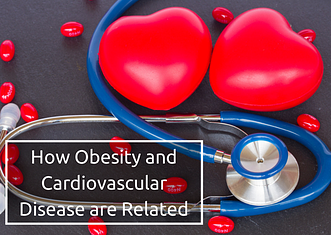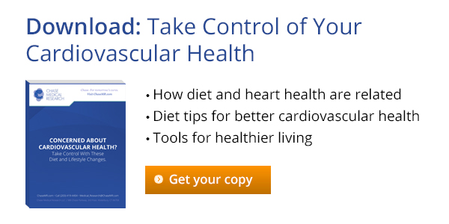Obesity is an epidemic that is facing our nation. In the United States, one out of every three adults is obese, and one out of every 20 adults has morbid obesity. This is problematic since it causes serious health issues. One example is cardiovascular disease which impacts people from all walks of life.
The Danger of Cardiovascular Disease

Cardiovascular disease is the number one cause of death around the world. In 2008 alone, over 17 million people died from cardiovascular disease. Some of the most common forms of cardiovascular disease include coronary heart disease, rheumatic heart disease, and congenital heart disease.
Obesity has been directly linked with an increased mortality rate as a result of its correlation with the various types of heart diseases.
There are several ways obesity and cardiovascular disease are related, depending on the particular disease and the severity of the obesity problem.
1. Hypertension
Any time someone has an elevated weight, the person at risk for hypertension. This condition is commonly known as high blood pressure. Hypertension elevates the risk of stroke, heart attack, and other common cardiovascular diseases.
2. Hyperlipidemia
Another common cardiovascular issue that obese people face is hyperlipidemia. Hyperlipidemia is an excessive amount of lipids and cholesterol in the blood. Hyperlipidemia can speed up the building of obstructions on the walls of arteries, which can lead to several different types of heart disease.
3. Diabetes Type 2
Type 2 diabetes is a condition that is commonly found in overweight individuals. Over time, obese individuals deplete their stores of insulin while developing insulin resistance. Diabetes leads to an increased risk of heart attack and stroke due to high blood pressure, high cholesterol, and high triglycerides.
4. Sleep Apnea
One of the lesser-known problems related to obesity is sleep apnea. Sleep apnea is a condition that causes the body to stop breathing or to breathe in a very shallow way for several seconds to several minutes. These events are known as apneas. This condition can cause hypertension as well as arrhythmia, or an irregular heartbeat.
5. Metabolic Syndrome
Metabolic syndrome is another ailment that is common in obese individuals. Metabolic syndrome is a combination of high cholesterol, high blood pressure, and high sugars. It is a group of problems that is often caused by obesity and can lead to several different kinds of heart disease, stroke, and diabetes.
How Weight Control Helps Reduce These Issues
Although changing your lifestyle and losing weight can be very challenging, it is not impossible if you set your mind to it. Exercising has a hormonal impact on the human body that increases the production of hormones that reduce our blood pressure, which correspondingly reduces the risk of cardiovascular disease.
Excessive weight also increases our insulin levels. Insulin is a hormone used by the body to reduce blood sugar. The more insulin present in the human body, the larger the fat cells become, which increases the amount of fatty tissue. When you lose weight, you use less insulin, which causes less fat to be developed in the body, decreasing the risk of cardiovascular disease.
Obesity is a serious condition that should be addressed sooner rather than later. Be sure that you keep a close eye on your health and your weight and learn as much as you can about ways obesity and cardiovascular disease are related, so that you can stop these kinds of cardiovascular problems from happening before they become an issue for your body.
Getting Started
If you’re interested in learning more about your cardiovascular health, download our free white paper – Concerned about Cardiovascular Health? Take Control with These Diet and Lifestyle Changes.
Download now to read about in-depth coverage of many cardiovascular risks, and steps you can take to prevent them.
Please contact us with any questions you may have!
Share This Post
Recent Posts
- Lp (a), A New Lab Test for Cardiovascular Risk November 25 2014
- Mediterranean Diet and Lifestyle Choices for Improved Health November 25 2014
- Understanding the Relationship Between Obesity & High Blood Pressure November 25 2014
- Cardiovascular Diseases Explained November 25 2014
- Understanding Body Mass Index (BMI) November 25 2014
Categories
- Clinical Trials
- Cardiovascular Disease
- Diabetes
- Obesity
- Kidney Disease
- Pain Management
- Female Sexual Dysfunction
- Migraine
- Vaccine
- Chronic Obstructive Pulmonary Disease
- Hypertension
- Osteoarthritis
- Biologics
- COVID-19
- Cholesterol
- Diabetic Peripheral Neuropathy
- Gastroesophageal Reflux Disease
- Irritable Bowel Syndrome with Constipation
- Lyme Disease
- Nonalcoholic Steatohepatitis
- Respiratory Syncytial Virus



